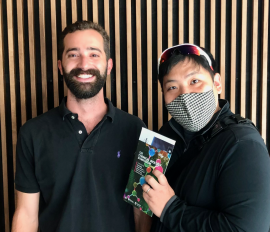San Francisco, CA —Mahajan lab postdoctoral fellows Young Joo Sun Ph.D. and David Dennis Ph.D. attended the inaugural Chemical Biology Symposium hosted by UCSF’s Quantitative Biosciences Institute, which had been delayed by COVID. The seminar aimed to foster collaborations across the biomedical, chemical, and physical sciences, seeking methods to address pressing problems in biology and biomedicine.

Vinit Mahajan M.D., Ph.D., professor of ophthalmology, vice chair for research, and ChEM-H fellow, said, “It’s important for our trainees to immerse themselves in science outside of ophthalmology. I like to send my postdocs to meetings where they can develop new ideas to further our therapeutic development programs. Inspiration can lead to research spin-offs that serve the needs of our patients.”
The symposium attracted many of the great minds in chemical biology from across the Bay Area representing UCSF, UC Berkely, Stanford, and biopharma companies. Speakers gave rapid-fire talks on their most advanced research insights. Session topics ranged from “protein and tissue engineering” to “natural and synthetic small molecules in drug discovery and therapy.”
Young Joo said, “I was surprised and felt privileged by the fact that more than one-third of the speakers are our collaborators, sharing their technology and insights with our lab’s translational eye disease research projects. Many others are close neighbors in our research community, including those conducting research in the same building as our lab.”
Peter Kim Ph.D., professor of Stanford Biochemistry and ChEM-H institute scholar, was the first evening’s keynote speaker. He commented that the format of the symposium was “like drinking from a fire hose.” The mood of the conference reflected a collective excitement to be back in-person again discussing science.
“It was fascinating to better understand the cutting-edge technologies of Stanford’s Polly Fordyce, Matthew Bogyo, and Alice Ting,” Young Joo said. “It is always exciting to hear from field-leading scientists who develop innovative technologies that address scientific questions to help boost translating scientific findings to patient care.”
He added, “I was especially inspired by the conceptual framework on the therapeutic targeting of the undruggable proteome by Daniel Nomura from UC Berkeley. It pushed me to think about new therapeutic strategies for the eye diseases we are targeting.”
David said, “Having recently made the transition from a chemistry-focused Ph.D. program to translational research seeking cures for eye disease, the symposium was an ideal way for me to understand a new field. Spending time with Young Joo was fun and rewarding. After each talk, we asked ourselves ‘how can this new technology we just learned about be applied towards the treatment of blinding eye diseases.’”
The meeting provided opportunities for scientists at all career stages, including faculty, undergrad, graduate, and postdoc levels to present their research in dynamic talks, Twitter interviews, panel discussions, poster sessions, and mixers.

